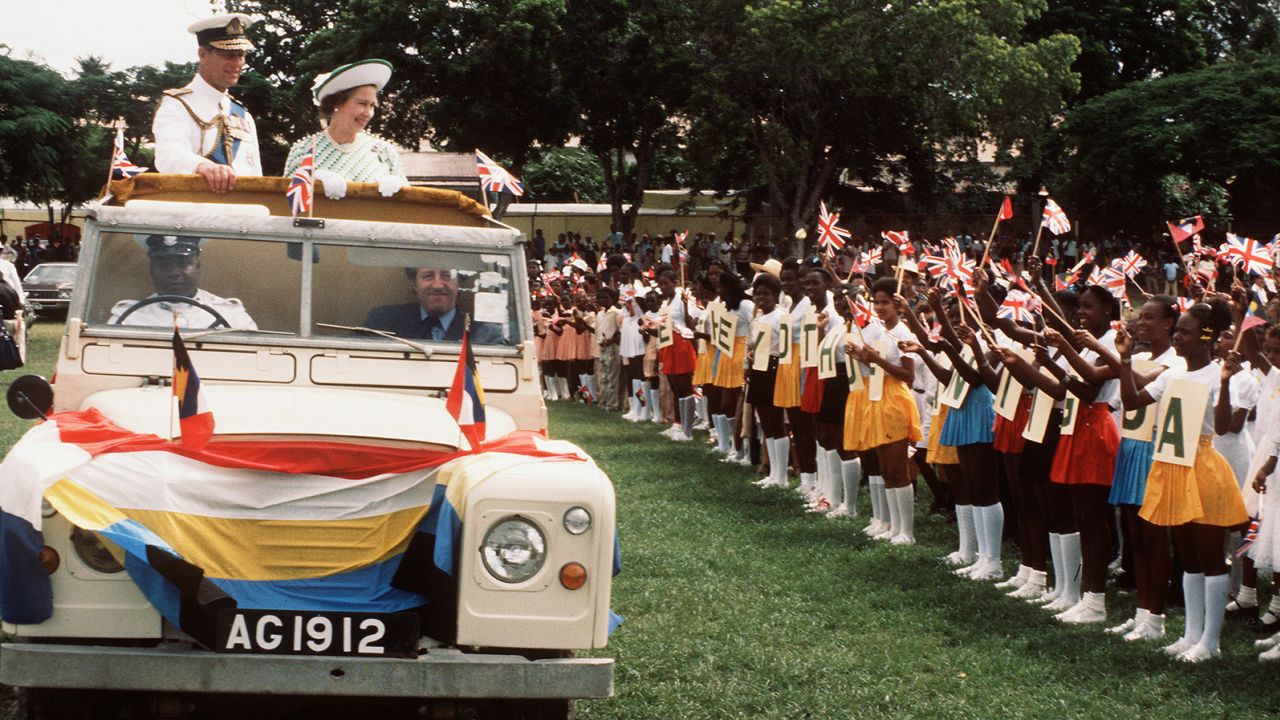(CNN) — Since the death of Queen Elizabeth II For the past week, Kris Manjapra has been thinking a lot about a peculiar moment in his childhood.
He told CNN that in 1990, when he was 12 years old and living with his family in Calgary, Canada, the queen paid a visit to his city. The students of his school were instructed to gather along the road to watch his procession and receive his greeting.
-
- What is the Commonwealth of Nations? What countries are part of it? How does it work?
“I was an immigrant kid in a very white city with my parents. We were struggling as new immigrants,” said Manjapra, a professor of history at Tufts University in Massachusetts, where his research focuses, among other things, on the critical study of race and colonialism. “And I remember thinking how strange it was that they used us (students) as props in some sort of parade.”
Manjapra, of mixed African and Indian descent, was born in the Bahamas in 1978, a year after the queen made her Silver Jubilee tour of the country. And like many other Americans with roots in Britain’s former Caribbean colonies, he has had a complicated reaction to the death of the queen, someone permanently linked to a history of empire. For them, the past week has been marked less by pain than by frustration at how little room there seems to be in the narrative for engagement with the often-ignored legacy of British colonialism in the region.
“What strikes me is how there seems to be so much energy to feel pain from the loss of an individual,” Manjapra said. “Certainly, the loss of a person should be mourned, especially by his family. But why is it so inaccessible to feel remorse and sorrow for all the damage that was done in the name of that same person?”
Queen Elizabeth II and Prince Philip, Duke of Edinburgh drive through the crowd during a tour of the Bahamas in 1977 Credit: Anwar Hussein/Hulton Archive/Getty Images
Marcia Bartlett, who was born in Jamaica in 1956 and grew up under British colonial rule, shares some of Manjapra’s sentiments. He lived on the island for almost 30 years before moving to New York, one of the states with more immigrants Caribbean, and said she has questioned the relationship between Britain and Jamaica since she was a curious high school student.
“Ever since then, I have had seeds of resentment towards these people who rule my island,” Bartlett told CNN.
Many of the former British colonies are united in the Commonwealth of Nations, a voluntary and loose association of 56 countries. Most of the members are republics. But 14, including the Bahamas and Jamaica, recognize the British monarch as their official head of state. In November 2021, Barbados became the first kingdom since 1992 to relinquish the crown.
Like many others in the United States with ties to the Caribbean, Bartlett was deeply moved by Barbados’ decision to throw off the monarchy, and hopes the rest of the region’s former imperial possessions will follow suit.
“I was glad,” he said. “I think (the transition to the republic) is going to come up in a referendum at some point in
Jamaica. There are still people with the mindset that it’s good to be run by the British. But as far as I’m concerned, Jamaica has to sink or swim by itself.”
Ingrained hostility
To understand the queen’s ambivalent legacy to the eyes of many Caribbean people and their descendants, let’s review part of the region’s history.
In the 18th century, the Caribbean it was a jewel in the crown of the British imperial economy; According to the SlaveVoyages database, more than two million enslaved people landed in the empire’s Caribbean colonies when the British slave trade was abolished in 1807.
However, “after slavery, freedmen were denied access to land and expected to work for low wages,” the University of California history professor wrote last year. Toronto Padraic Scanlan for the Washington Post. “Emancipation policies also turned out to be a useful justification for imperialism.”
Social and political challenges have persisted even since the mid-20th century, a groundbreaking time when many British colonies declared their independence.
“The British left a disaster when formal colonization began to end in the 1960s,” Manjapra explained. “However, during the queen’s first speech in Jamaica, in 1966, she only spoke of the ‘loyalty and kindness’ of the people of the Commonwealth Never recognized the damage caused by the looting, massacres, deprivation and racism of British rule “.
Manjapra underlined the irresponsibility shown by Great Britain in the Caribbean during the decade.
“There was a kind of abandonment of the disorder that colonialism had created, leaving the Caribbean very indebted, without resources, with very weak institutions, things that people there are still suffering today,” he said.
Also, there is the question of the legacy of slavery: the queen’s relative silence on the matter. After Great Britain formally abolished the practice of human slavery in its colonies in the 1830s, it called for a 20 million pound loan to compensate slave owners.
“Until 2015, the British state was paying this debt,” said Manjapra. “There was a deeply immoral practice going on that finally came to light a few years ago. But the queen remained silent. The queen’s silence on so many issues related to justice for colored people in Britain and in the former colonies, I cannot interpret it as a duty or a dignity or as something ‘apolitical’. That silence was a very political act, and essential for the mechanism of the British State”.
The Royal Family has acknowledged, but stopped short of apologizing, for Britain’s many imperial crimes and their lingering effects on the Caribbean.
“An apology would be nice, but nothing,” said Bartlett.
Last March, when Prince William and Kate toured the Caribbean, relations deteriorated and they were greeted by anti-colonial protests.
Denying it won’t make it go away
The death of the queen can open a new chapter in the Caribbean.
New York University law professor Melissa Murray, whose family is Jamaican, recently noted on Twitter that the queen’s passing could reignite crucial debates about the role of Commonwealth ties in the region.
” I imagine that his death will accelerate the debates on colonialism, reparations or compensation and the future of the Commonwealth”, wrote Murray. “We are likely to linger on the difficult conversation that will inevitably come from acknowledging our past. And even for those who respect and revere the queen, the residue of colonialism casts a shadow over everyday life in Jamaica and other parts of the Caribbean.”
Manjapra, author of the 2022 book “Black Ghost of Empire: The Long Death of Slavery and the Failure of Emancipation”, shared Murray’s sentiments. In particular, he stressed that in order to lay the foundations for the future it is necessary not to hide Britain’s appalling legacy of colonial violence. trying to find an immediate solution,” she said. “We confront painful stories by acknowledging their presence in our lives and in our world, and then engaging in discussion, creating opportunities for meaningful conversation about what a healing future can look like.”
Doing all this, of course, requires time, effort effort and investment.
“Frankly, it’s the reparations conversation,” Manjapra said. “Reparations are on the table, and they must be in order to deal with what happened and what continues to happen”.
- Put a little more bluntly, he added, “colonial conditions are not in the past, but persist and continue to reinforce the racial caste system.”











